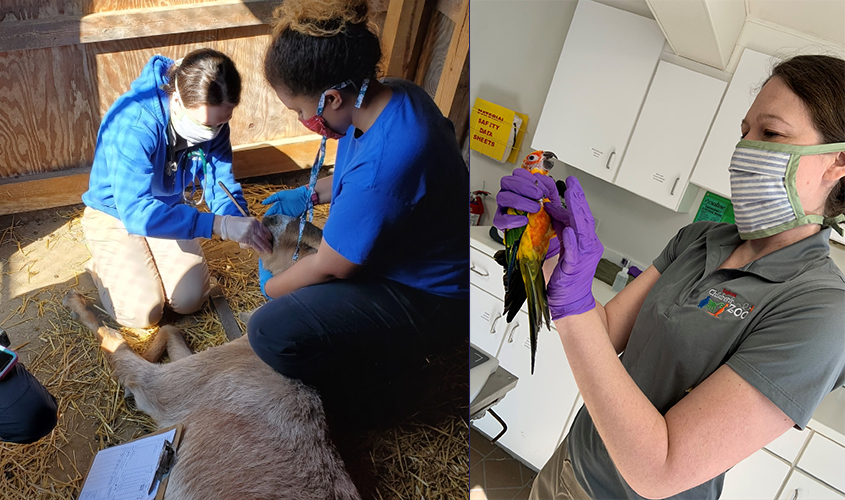
As physicians, nurses, and other health professionals have treated human patients in need during the COVID-19 pandemic, the importance of One Health One Medicine—the philosophy that human, animal, and ecosystem health are intertwined—has become more visible now than ever, thrusting veterinarians such as Shannon Cerveny neé Shaw, DVM ’07, onto the front lines of the global health crisis.
“When the outbreak started, our first priority at the zoo was to concentrate on the health and safety of our collection of animals, our staff, and our guests,” said Dr. Cerveny, a veterinarian at Saginaw Children’s Zoo in Michigan. “It was critical that we quickly establish protocols to keep everyone safe.”
Returning to her home state of Michigan only four months before the COVID outbreak, Dr. Cerveny was quickly propelled into action as the first-ever full-time veterinarian at the zoo. Her new job entailed not only caring for the animals within the zoo’s collection, but included providing emergency medical and surgical care, developing preventive medicine protocols, evaluating animals in quarantine, assessing potential research and conservation involvement, and also providing input to the zoo’s occupational health program.
“With the discovery that COVID-19 was present in exotic felids at another zoological institution, I think it heightened the concern level of many zoo veterinarians, as we hoped to ameliorate any potential risks to our own animals and staff,” stated Dr. Cerveny. “Currently, we don’t have any felids at our zoo except for one lovely office cat. However, we do have nonhuman primates and mustelids that are also considered at-risk species. That’s one of the reasons why, although I am working from home when possible, I am still coming in to provide medical care to the animals, with the help of our veterinary technician.”
In addition to COVID being a health crisis, it has also quickly become an economic one. According to Dr. Cerveny, her zoo is currently not open to the public and therefore, it isn’t generating any revenue from ticket sales and concessions. Even though she believes the Saginaw Children’s Zoo to be in a good place financially, she knows that many other zoos are struggling to stay afloat.
“At the beginning of the outbreak, it was essential that as the zoo management staff, we create biosecurity protocols to keep everyone safe while coming to work and caring for the animals,” commented Dr. Cerveny. “Today, we are also continuously developing and refining those protocols to ensure the safety of both our staff and our guests when we can safely re-open.”
Dr. Shannon Cerveny – The Early Years
Before even deciding to become a veterinarian, Dr. Cerveny knew she was destined for a career working at a zoo. Having always had a passion for helping to care for and conserve endangered species, her very first zoo job was an internship as a penguin zookeeper at the Detroit Zoo.
“I love knowing that the work zoos are doing is having such a positive impact on global biodiversity,” shared Dr. Cerveny. “I also love to travel, and my career has taken me to some amazing places, including the Galapagos Islands to work with endangered Galapagos penguins.”
Dr. Cerveny grew up in the lake town of Port Huron, MI, graduating from the Honors College at Michigan State University with a degree in zoology in 2002. She then applied and was accepted into the Doctor of Veterinary Medicine program at SGU. She completed her clinical year at North Carolina State University.
As a student, Dr. Cerveny recalls having several life-changing experiences, including traveling to Uganda in 2005 with several other SGU veterinary classmates to work on a research project with wild lions. After returning to the US with her veterinary medical degree safely in tow, Dr. Cerveny later held positions as a veterinarian at the St. Louis Zoo and San Antonio Zoo. She also did an internship and her residency in zoological medicine at Louisiana State University and the Oklahoma City Zoo respectively.
Today, she serves as the first full-time veterinarian at the Saginaw Children’s Zoo in Michigan. With the discovery of a link between wildlife trafficking and the current health crisis, Dr. Cerveny and her fellow veterinarians are answering the call to join in the fight for the benefit of human and animal kind.
“When I started at the zoo, we were just beginning to ramp up our preventive medicine program,” stated Dr. Cerveny, “but we had to scale that back when the Michigan order for ‘essential only’ veterinary procedures came through. We were also in the process of purchasing some much-needed diagnostic and laboratory equipment and I was just starting to become involved with some local Michigan conservation projects. I can’t wait to get back on track with all of it, and we are anxious to continue developing our veterinary program.”
–Ray-Donna Peters